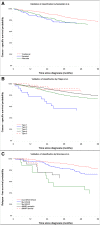External validation of molecular subtype classifications of colorectal cancer based on microsatellite instability, CIMP, BRAF and KRAS
- PMID: 31296182
- PMCID: PMC6624952
- DOI: 10.1186/s12885-019-5842-7
External validation of molecular subtype classifications of colorectal cancer based on microsatellite instability, CIMP, BRAF and KRAS
Abstract
Background: Competing molecular classification systems have been proposed to complement the TNM staging system for a better prediction of survival in colorectal cancer (CRC). However, validation studies are so far lacking. The aim of this study was to validate and extend previously published molecular classifications of CRC in a large independent cohort of CRC patients.
Methods: CRC patients were recruited into a population-based cohort study (DACHS). Molecular subtypes were categorized based on three previously published classifications. Cox-proportional hazard models, based on the same set of patients and using the same confounders as reported by the original studies, were used to determine overall, cancer-specific, or relapse-free survival for each subtype. Hazard ratios and confidence intervals, as well as Kaplan-Meier plots were compared to those reported by the original studies.
Results: We observed similar patterns of worse survival for the microsatellite stable (MSS)/BRAF-mutated and MSS/KRAS-mutated subtypes in our validation analyses, which were included in two of the validated classifications. Of the two MSI subtypes, one defined by additional presence of CIMP-high and BRAF-mutation and the other by tumors negative for CIMP, BRAF and KRAS-mutations, we could not confirm associations with better prognosis as suggested by one of the classifications. For two of the published classifications, we were able to provide results for additional subgroups not included in the original studies (men, other disease stages, other locations).
Conclusions: External validation of three previously proposed classifications confirmed findings of worse survival for CRC patients with MSS subtypes and BRAF or KRAS mutations. Regarding MSI subtypes, other patient characteristics such as stage of the tumor, may influence the potential survival benefit. Further integration of methylation, genetic, and immunological information is needed to develop and validate a comprehensive classification that will have relevance for use in clinical practice.
Keywords: Cancer-specific survival; Colorectal cancer; External validation; Molecular subtypes.
Conflict of interest statement
The authors declare that they have no competing interests. Author MK is an Editorial Board member for the journal.
Figures

Similar articles
-
Association between molecular subtypes of colorectal cancer and patient survival.Gastroenterology. 2015 Jan;148(1):77-87.e2. doi: 10.1053/j.gastro.2014.09.038. Epub 2014 Sep 30. Gastroenterology. 2015. PMID: 25280443 Free PMC article.
-
Colorectal cancer molecular classification using BRAF, KRAS, microsatellite instability and CIMP status: Prognostic implications and response to chemotherapy.PLoS One. 2018 Sep 6;13(9):e0203051. doi: 10.1371/journal.pone.0203051. eCollection 2018. PLoS One. 2018. PMID: 30188916 Free PMC article.
-
Associations between colorectal cancer molecular markers and pathways with clinicopathologic features in older women.Gastroenterology. 2013 Aug;145(2):348-56.e1-2. doi: 10.1053/j.gastro.2013.05.001. Epub 2013 May 7. Gastroenterology. 2013. PMID: 23665275 Free PMC article.
-
Serrated colorectal cancer: Molecular classification, prognosis, and response to chemotherapy.World J Gastroenterol. 2016 Apr 7;22(13):3516-30. doi: 10.3748/wjg.v22.i13.3516. World J Gastroenterol. 2016. PMID: 27053844 Free PMC article. Review.
-
Clinical significance and prognostic relevance of KRAS, BRAF, PI3K and TP53 genetic mutation analysis for resectable and unresectable colorectal liver metastases: A systematic review of the current evidence.Surg Oncol. 2018 Jun;27(2):280-288. doi: 10.1016/j.suronc.2018.05.012. Epub 2018 May 8. Surg Oncol. 2018. PMID: 29937183 Review.
Cited by
-
Is ypTNM staging a comparable predictor as pTNM staging for survival in non-metastatic rectal cancer after preoperative chemoradiation therapy?Oncol Res. 2024 Oct 16;32(11):1723-1732. doi: 10.32604/or.2024.052098. eCollection 2024. Oncol Res. 2024. PMID: 39449806 Free PMC article.
-
Validation of the prognostic value of CD3 and CD8 cell densities analogous to the Immunoscore® by stage and location of colorectal cancer: an independent patient cohort study.J Pathol Clin Res. 2023 Mar;9(2):129-136. doi: 10.1002/cjp2.304. Epub 2022 Nov 24. J Pathol Clin Res. 2023. PMID: 36424650 Free PMC article.
-
Response to neoadjuvant treatment among rectal cancer patients in a population-based cohort.Int J Colorectal Dis. 2021 Jan;36(1):177-185. doi: 10.1007/s00384-020-03744-2. Epub 2020 Sep 19. Int J Colorectal Dis. 2021. PMID: 32949260 Free PMC article.
-
Risk Factors and Incidence of Colorectal Cancer According to Major Molecular Subtypes.JNCI Cancer Spectr. 2020 Oct 7;5(1):pkaa089. doi: 10.1093/jncics/pkaa089. eCollection 2021 Feb. JNCI Cancer Spectr. 2020. PMID: 33442661 Free PMC article.
-
Novel molecular classification of colorectal cancer and correlation with survival.Saudi J Biol Sci. 2022 May;29(5):3929-3936. doi: 10.1016/j.sjbs.2022.03.014. Epub 2022 Mar 10. Saudi J Biol Sci. 2022. PMID: 35844384 Free PMC article.
References
-
- Ferlay J, Soerjomataram I, Ervik M, Dikshit R, Eser S, Mathers C, et al. GLOBOCAN 2012. v1.0, Cancer incidence and mortality worldwide: IARC CancerBase no.11. Lyon: International Agency for Research on Cancer; 2013.
MeSH terms
Substances
Grants and funding
LinkOut - more resources
Full Text Sources
Medical
Research Materials
Miscellaneous

